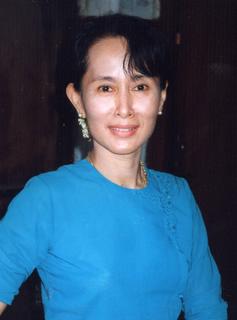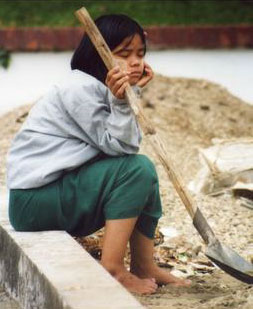A few months ago, we invited Globetrotter e-newsletter readers to send us their views on visiting Burma. One of the responses we included in February 2004 was from a retired British diplomat, Derek Tonkins. Since this time, Burma Campaign have been in touch and provided an alternative view on visiting Burma.
While there is much that is misleading and inaccurate in Derek Tonkin's article 'Burma Revisited', no-one can argue with the statement that “we should primarily be guided by the wishes and advice of the Burmese people”. However, the wishes of the Burmese people for or against tourism cannot be gauged from a dubious survey of anecdotal reports. In fact, with around 75% of Burma's people making their living from agriculture, most people in Burma have never met a tourist.
 The fact is that the
call for a tourism boycott comes from Burma's elected
leaders. The National League for Democracy (NLD), who won a
landslide victory in Burma's 1990 election, remains the
only party mandated to represent the Burmese people and it is
a party that continues to draw the support and respect of
people inside and outside the country. Burma's Government
in exile, the National Coalition Government of the Union of
Burma (NCGUB), supports the boycott and it is a position that
has the backing of exile Burmese democracy groups around the
world.
The fact is that the
call for a tourism boycott comes from Burma's elected
leaders. The National League for Democracy (NLD), who won a
landslide victory in Burma's 1990 election, remains the
only party mandated to represent the Burmese people and it is
a party that continues to draw the support and respect of
people inside and outside the country. Burma's Government
in exile, the National Coalition Government of the Union of
Burma (NCGUB), supports the boycott and it is a position that
has the backing of exile Burmese democracy groups around the
world.
Derek Tonkin's criticism of Aung San Suu Kyi for not having “had time to discuss it [tourism policy] properly” in May 2002, when she had only just been released from house arrest, may leave him wondering what NLD policy really is. However, a look at their official statements will show that in 2003 the NLD confirmed that “the present situation has not reached the extent that tourists should be encouraged to visit Myanmar (Burma).”
Burma's military regime has identified tourism as a vital source of income and it is working hard to develop the industry. According to the Ministry of Tourism, its top two objectives in developing tourism are to generate foreign exchange earnings and attract foreign investment. Compared to its neighbours, Burma's tourism industry may be small but it is still earning a cash strapped regime millions of dollars every year. It seems odd that while Derek Tonkin is arguing for more tourists to visit Burma, he also admits that an increase in tourist numbers would help prop up the regime. Such a rise in tourist numbers would also result in an increase in investment to support that tourism. But investment in Burma does not benefit the vast majority of ordinary Burmese people. The regime spends nearly half the government budget on the military but less than 44p per person per year on health and education combined.
 The article also fails to mention
that in Burma many human rights abuses are directly connected
to the regime's drive to develop the country for
tourists. Throughout Burma men, women and children have been
forced to labour on roads, railways and tourism projects;
more than one million people have been forced out of their
homes in order to 'beautify' cities, suppress
dissent, and make way for tourism developments, such as
hotels, airports and golf courses. And these abuses are not
confined to history. In February 2004, for example, Burmese
soldiers rounded up ethnic Salons, or 'sea gypsies'
who normally live on boats in the Mergui Archipelago, forced
them to live on land and to take part in a 'Salon
Festival' aimed at foreign tourists.
The article also fails to mention
that in Burma many human rights abuses are directly connected
to the regime's drive to develop the country for
tourists. Throughout Burma men, women and children have been
forced to labour on roads, railways and tourism projects;
more than one million people have been forced out of their
homes in order to 'beautify' cities, suppress
dissent, and make way for tourism developments, such as
hotels, airports and golf courses. And these abuses are not
confined to history. In February 2004, for example, Burmese
soldiers rounded up ethnic Salons, or 'sea gypsies'
who normally live on boats in the Mergui Archipelago, forced
them to live on land and to take part in a 'Salon
Festival' aimed at foreign tourists.
A further claim that “travel and tourism advance the cause of democracy” is totally unsubstantiated. Tourists in Burma rarely witness the internal repression so prevalent in the country, indeed much of Burma remains strictly off-limits to tourists. One tour operator to Burma recently remarked “I regularly travel throughout Myanmar and have never seen any of the abuses that appear in the Western press”.
The typical tourist on holiday in Burma is there to visit a beautiful country, look at the historic monuments and temples and enjoy an exotic holiday destination. But even for those tourists wishing to see Burma's problems for themselves, there is very little opportunity to discover the realities of life in Burma. Burmese people are not free to discuss politics with foreigners and can face punishment or imprisonment if the strict regulations for dealing with foreigners are not adhered to. For example, in September 2004 two Japanese tourists were arrested for not obtaining a visa within the country to visit a ruby-mine town in Shan State. Their two Burmese companions were charged with laws relating to hotel and tourism acts and their two Burmese hosts were charged with failure to report the presence of strangers to the authorities.
The people of Burma need our support and solidarity. We can provide that support very simply by listening to Burma's democrats and choosing not to holiday in Burma.
The Burma Campaign UK is part of a global movement for democracy in Burma and is the only national organisation in the UK dedicated to campaigning for human rights and democracy in Burma. For more information on Burma Campaign’s activities, see: www.burmacampaign.org.uk
